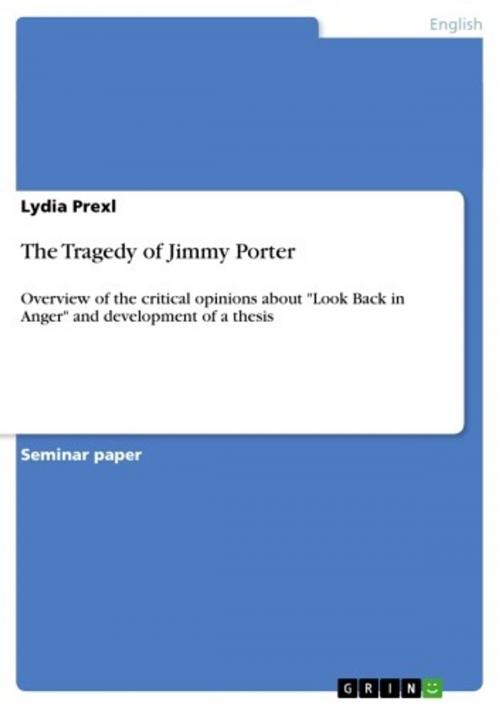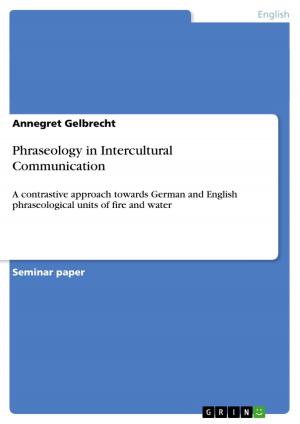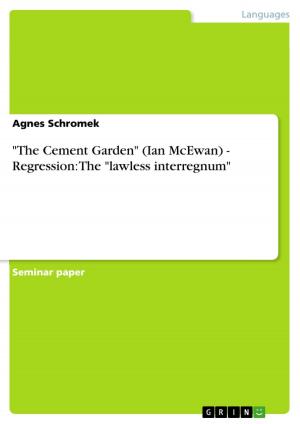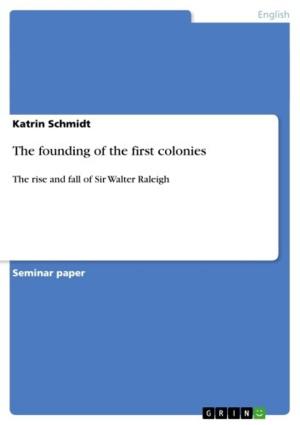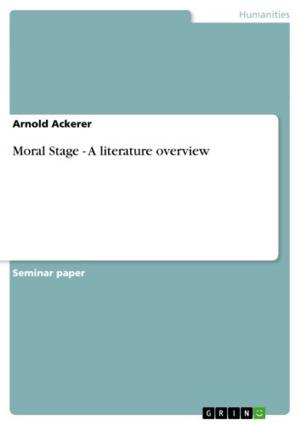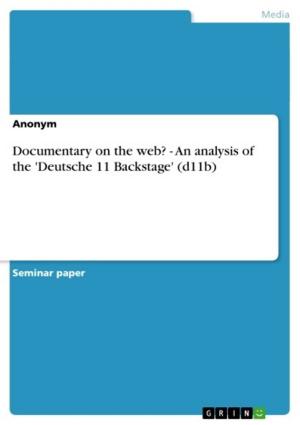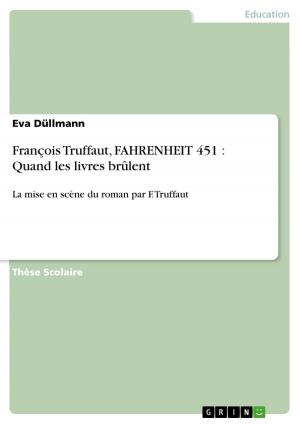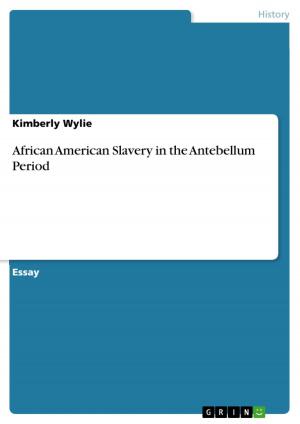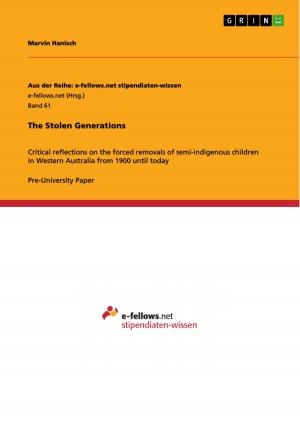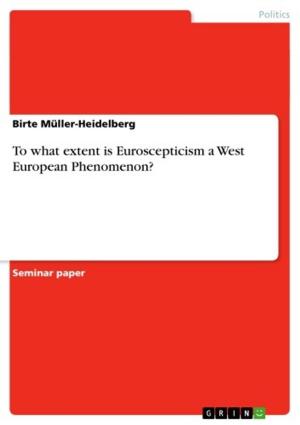The Tragedy of Jimmy Porter
Overview of the critical opinions about 'Look Back in Anger' and development of a thesis
Fiction & Literature, Literary Theory & Criticism, British| Author: | Lydia Prexl | ISBN: | 9783640349319 |
| Publisher: | GRIN Publishing | Publication: | June 17, 2009 |
| Imprint: | GRIN Publishing | Language: | English |
| Author: | Lydia Prexl |
| ISBN: | 9783640349319 |
| Publisher: | GRIN Publishing |
| Publication: | June 17, 2009 |
| Imprint: | GRIN Publishing |
| Language: | English |
Seminar paper from the year 2007 in the subject English Language and Literature Studies - Literature, grade: 1,3, University of Mannheim, language: English, abstract: It is widely accepted that John Osborne's play Look Back in Anger was a turning-point in the history of British theatre, a milestone introducing the era of the New British Drama. Osborne remembers: 'On 8 May 1956 [...] Look Back in Anger had its opening at the Royal Court Theatre. This [...] particular date seems to have become fixed in the memories of theatrical historians' and Lacey emphasises: 'The moment of John Osborne's Look Back in Anger [...] was undoubtedly a symbolic one in the history of post-war British theatre and of post-war culture generally.' However, Look Back in Anger was not perceived as a break-through right from the beginning. Rather, Osborne had to cope with shattering criticism and at first, his play was a crushing defeat. Osborne himself summarized the reactions towards Look Back in Anger in his autobiography about thirty years later: 'There was a vehement, undisputed judgement: the play was a palpable miss.' Nearly all reviews focused on the play's hero Jimmy Porter, whose nature they depicted as the reason for the 'essential wrongness' of the play. Jimmy was seen as 'a bitter young misfit,' 'a boor, self-pitying, self-dramatising rebel' and a 'cynical, neurotic [young man] of working-class stock,' whose 'continuous tirade against life [...] ha[d] a deadening effect upon the whole play.' Cecil Wilson sharpened the criticism when she exclaimed that Jimmy Porter's bitterness and his savage and often vulgar talk 'crie[d] out for a knife.' However, the attitudes towards Osborne and his first play changed with the publication of Kenneth Tynan's testimony in the Sunday newspaper a week later stating that he could hardly 'love anyone who did not wish to see Look Back in Anger. It is the best young play of its decade.' This provocative review suddenly shed a new light on the play. Overnight, Look Back in Anger had become a success, its (anti-)hero Jimmy Porter 'the first young voice to cry out for a new generation that had forgotten the war, mistrusted the welfare state and mocked its established rulers with boredom, anger and disgust' and John Osborne had become a celebrated young writer. Owing to its literary key role in the history of British Drama I would like to give a brief overview of the critical opinions about Look Back in Anger before I move on to developing my own thesis.
Seminar paper from the year 2007 in the subject English Language and Literature Studies - Literature, grade: 1,3, University of Mannheim, language: English, abstract: It is widely accepted that John Osborne's play Look Back in Anger was a turning-point in the history of British theatre, a milestone introducing the era of the New British Drama. Osborne remembers: 'On 8 May 1956 [...] Look Back in Anger had its opening at the Royal Court Theatre. This [...] particular date seems to have become fixed in the memories of theatrical historians' and Lacey emphasises: 'The moment of John Osborne's Look Back in Anger [...] was undoubtedly a symbolic one in the history of post-war British theatre and of post-war culture generally.' However, Look Back in Anger was not perceived as a break-through right from the beginning. Rather, Osborne had to cope with shattering criticism and at first, his play was a crushing defeat. Osborne himself summarized the reactions towards Look Back in Anger in his autobiography about thirty years later: 'There was a vehement, undisputed judgement: the play was a palpable miss.' Nearly all reviews focused on the play's hero Jimmy Porter, whose nature they depicted as the reason for the 'essential wrongness' of the play. Jimmy was seen as 'a bitter young misfit,' 'a boor, self-pitying, self-dramatising rebel' and a 'cynical, neurotic [young man] of working-class stock,' whose 'continuous tirade against life [...] ha[d] a deadening effect upon the whole play.' Cecil Wilson sharpened the criticism when she exclaimed that Jimmy Porter's bitterness and his savage and often vulgar talk 'crie[d] out for a knife.' However, the attitudes towards Osborne and his first play changed with the publication of Kenneth Tynan's testimony in the Sunday newspaper a week later stating that he could hardly 'love anyone who did not wish to see Look Back in Anger. It is the best young play of its decade.' This provocative review suddenly shed a new light on the play. Overnight, Look Back in Anger had become a success, its (anti-)hero Jimmy Porter 'the first young voice to cry out for a new generation that had forgotten the war, mistrusted the welfare state and mocked its established rulers with boredom, anger and disgust' and John Osborne had become a celebrated young writer. Owing to its literary key role in the history of British Drama I would like to give a brief overview of the critical opinions about Look Back in Anger before I move on to developing my own thesis.
